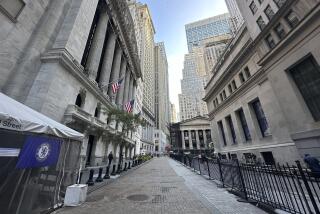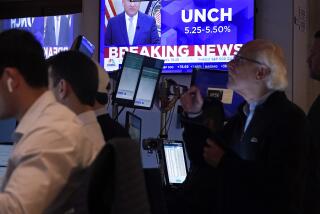Europe’s Markets Look Attractive Despite Gains
- Share via
Most European stock markets have rallied briskly over the past week, as the Continent’s latest currency crisis opened the door to much-needed interest rate cuts.
Despite the markets’ gains, many international stock mutual fund managers say they’re still eager to boost their ownership of European shares, anticipating an economic recovery.
“I think we’ll continue to increase our holdings in Europe, in general, and France, in particular,” says David Peebles, manager of the USAA International stock fund in San Antonio, Tex.
On Tuesday, European markets were mixed after Germany, Spain and the Netherlands eased interest rates slightly--the first sign that the European Community’s weekend decision to allow currency devaluations would lead to lower rates.
In Frankfurt, the DAX index leaped 28.35 points to 1,843.43. And in Zurich, the blue-chip index surged 30.20 points to a record 2,430.50. But in Paris, the CAC-40 index slid 18.45 points to 2,110.58, retreating from Monday’s near-record.
International stock fund managers say the excitement over Europe may well cool temporarily soon, especially if further rate cuts are slow in coming. But from the American perspective, any profit taking would be an invitation to buy.
*
Why? As the accompanying chart shows, most European markets appear considerably cheaper than the U.S. market--even though European stocks have been rising much faster than U.S. stocks for most of this year.
Measuring price-to-earnings ratios, for example, the average U.S. stock sold for 21.3 times the prior 12 months’ earnings per share at the end of July, while Swiss stocks were 17.8 times, Dutch shares were 16.1 times and Spain’s were 13.6 times.
“Valuations in Europe are pretty reasonable, especially considering that corporate earnings there are at a depressed point in the cycle,” says George Murnaghan, vice president at the T. Rowe Price International Stock fund in Baltimore.
Likewise, most European stocks sell for lower price-to-book-value ratios (stock price relative to the value of the company’s assets) than U.S. shares, and have higher dividend yields.
Those calculations, from Morgan Stanley Capital International, must be approached with care, because accounting differences make apple-to-apple comparisons of world stock data tough. Still, many global fund managers figure their basic premise about Europe is unassailable: Things can only get better if interest rates fall.
USAA’s Peebles believes that France will be a prime beneficiary, because the country’s low inflation rate suggests that interest rates have furthest to fall there. His fund has 6.5% of its assets in French shares--including telecommunications firm Alcatel, entertainment giant Canal Plus and energy company Total--and Peebles intends to raise his French holdings.
Harold Sharon, analyst at the Warburg Pincus International Equity fund in New York, says his fund is heavily invested in European financial stocks in general. Just as U.S. bank and insurance stocks rose powerfully in 1991 and 1992 as U.S. interest rates dropped, Sharon sees the same pattern unfolding in Europe.
Among his holdings are French reinsurance firm Scor, Spanish banking giant Banco Santander, and a French consumer credit company called Cetelen.
Sharon also believes that it’s too early to buy German stocks, because the inflation-paranoid Bundesbank is least likely to make deep rate cuts. Instead, Sharon enters Germany through “backdoor” plays--such as Austrian building-supply firm Maculan.
One concern for all of these managers is the dollar. If it continues to rise as European currencies are devalued, market gains could be wiped out. But many managers attempt to lower their currency risk via hedging techniques.
Others note that if a fund is well-diversified globally, currency gains and losses among Asian, European and American shares often cancel each other out anyway--which leaves the manager’s stock-picking prowess as the ultimate determinant of fund performance, as indeed it should be.
Finally, if you’re weighing international-fund choices based on where they’re invested, here’s one dissenting vote on Europe from a veteran global-stock fund manager. “I still see the greatest opportunities in the Far East,” says Mark Edersheim, manager of the Smith Barney International Equity fund in New York.
His fund is nearly half invested in Asia, because he figures Asian markets are win-win: Those economies are growing now, while Europe is in recession. If Europe booms again, it can only help Asian economies grow even faster, he says.
Comparing Markets
Here’s how the U.S. stock market compared with other world markets at the end of July, using three major yardsticks. Data is based on stocks’ most recent 12-month financial results.
Price-to- Price-to- Dividend Market book ratio earnings yield Japan 2.22 68.6 0.8% Germany 1.89 21.9 3.1% United States 2.54 21.3 2.8% Britain 2.19 20.9 4.1% France 1.64 20.8 3.2% Australia 1.63 18.7 3.3% Singapore 1.53 18.2 1.6% Belgium 1.49 17.8 4.4% Switzerland 1.91 17.8 1.8% Netherlands 1.71 16.1 3.7% Hong Kong 2.11 15.3 3.4% Spain 1.28 13.6 4.1%
Source: Morgan Stanley Capital International
More to Read
Inside the business of entertainment
The Wide Shot brings you news, analysis and insights on everything from streaming wars to production — and what it all means for the future.
You may occasionally receive promotional content from the Los Angeles Times.










